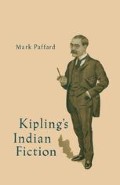Abstract
Soon after his return from India to London in 1889 Kipling wrote that ‘The long-haired literati of the Savile Club are swearing that I ‘invented’ my soldier talk in Soldiers Three. Seeing that not one of these critters has been within earshot of a barrack, I am naturally wrath’.1 He also wrote the set of verses bemoaning London to his friends in India, entitled ‘In Partibus’, of which the above is the final stanza. Kipling’s affection for and devotion to the army in all its aspects was life-long. In his fiction the man who ‘hogs his bristles short’ is not always a paragon of virtue, but he can be forgiven almost anything but treachery, and this includes a certain amount of brutality, coldbloodedness, and even loss of nerve and running away. His irritation with the Savile Club literati is not directed so much at the assumption that his portraits of soldiers were not founded entirely on fact — they were not, as we shall see — as at the implication that he was exploiting a novelty rather than writing from personal sympathy. Kipling’s very real interest in the army was certainly genuine, but his experience was limited to what he gathered from the officers and other ranks stationed at Fort Lahore. He possessed a ready ear and a devotion to the military virtues rather than much military knowledge.
It’s Oh to meet an Army man, Set up, and trimmed and taut, Who does not spout hashed libraries Or think the next man’s thought, And walks as though he owned himself, And hogs his bristles short.
Access this chapter
Tax calculation will be finalised at checkout
Purchases are for personal use only
Preview
Unable to display preview. Download preview PDF.
Notes and References
Charles Carrington, Rudyard Kipling - His Life and Work (Harmondsworth: Penguin Books, 1970) p. 184.
In Rudyard Kipling, The Complete Barrack-Room Ballads (London: Methuen, 1973) p. 5.
Kenneth Ballhatchet, Race, Sex and Class under the Raj (London: Weidenfeld and Nicholson, 1978) p. 182.
J. H. Fenwick, ‘Soldiers Three’ in Andrew Rutherford (ed.), Kipling’s Mind and Art (London: Oliver & Boyd, 1964).
Lord Birkenhead, Rudyard Kipling (London: Weidenfeld & Nicholson, 1978) p. 70.
Kipling’ in Elliott L. Gilbert (ed.), Kipling and the Critics (London: Peter Owen, 1966) p. 95.
Adrian Poole, Gissing in Context (London: Macmillan, 1975) p. 23.
Copyright information
© 1989 Mark Paffard
About this chapter
Cite this chapter
Paffard, M. (1989). Soldiers in India. In: Kipling’s Indian Fiction. Palgrave Macmillan, London. https://doi.org/10.1007/978-1-349-20272-0_3
Download citation
DOI: https://doi.org/10.1007/978-1-349-20272-0_3
Publisher Name: Palgrave Macmillan, London
Print ISBN: 978-1-349-20274-4
Online ISBN: 978-1-349-20272-0
eBook Packages: Palgrave Literature & Performing Arts CollectionLiterature, Cultural and Media Studies (R0)

